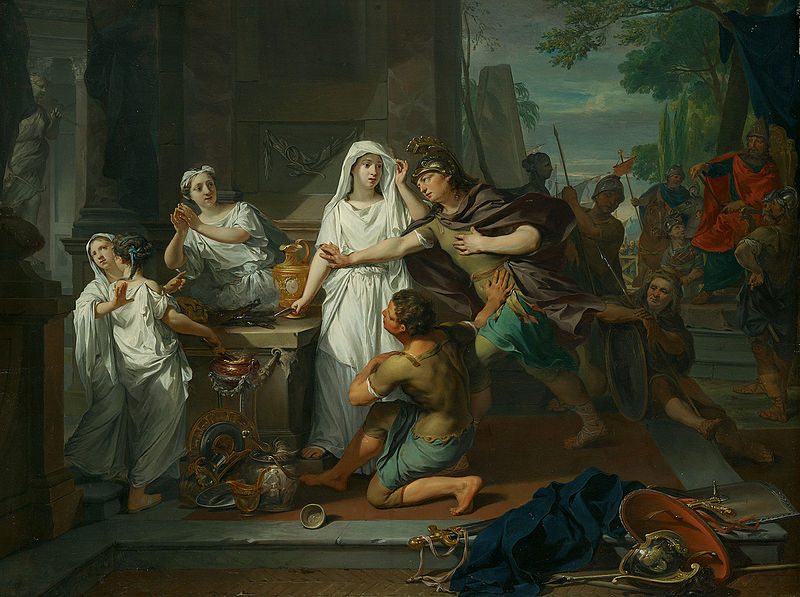PYLADES IN GREEK MYTHOLOGY
Pylades was a prince of Phocis in Greek mythology, most famous for his friendship with Orestes, the son of Agamemnon.
Pylades Son of Strophius
Pylades was the son of Strophius, King of Phocis, and his wife Anaxibia; Anaxibia was the sister of Agamemnon and Menelaus, thus Pylades was cousin to the likes of Orestes, Iphigenia, Electra and Hermione.
Pylades' Friendship with OrestesPylades, and his cousin Orestes, would become the closest of friends, for at the end of the Trojan War, Agamemnon was murdered by Clytemnestra and Aegisthus, when the king returned to Mycenae. Orestes would likely have been killed by Aegisthus as well, but Agamemnon’s son was spirited away to the safety of Phocis.
Pylades and Orestes thus grew into adulthood together. |
|
Pylades in MycenaeOrestes, when of age, decided to avenge his father, and Pylades would join him in his quest.
To gain access to the royal household at Mycenae, Pylades and Orestes came in disguise as messengers of Phocis, with Pylades first entering the Mycenaen palace with an urn. This urn, Pylades claimed held the ashes of Orestes, for the lie was told that Orestes had been killed. This gained Pylades and Orestes an audience with Clytemnestra, and this was when Orestes struck, killing his own mother. Some tell of Pylades convincing Orestes that the death blow must be inflicted, when Orestes wavered over killing his own mother. Aegisthus was then killed by Orestes as well, but it was told that though the Royal guard did not intervene, Pylades had to kill two of the sons of Nauplius who would have sought to save Aegisthus. Pylades banishedInitially, Pylades would return home to Phocis, but he found that he was no longer welcome there, for his own father banished him for his role in the killing of the King and Queen of Mycenae.
|
|
Returning again to Orestes side, he found his cousin in trouble, for he was being tried for the murder of Clytemnestra and Aegisthus. Pylades would suggest the murder of Helen and kidnapping of Hermione might help Orestes in his predicament, although this plan did not come to fruition, for Apollo intervened.
It was though, not just the mortal justice that Orestes had to face, for the crime of matricide had also brought forth the Erinyes, to torment the son of Agamemnon.
It was though, not just the mortal justice that Orestes had to face, for the crime of matricide had also brought forth the Erinyes, to torment the son of Agamemnon.
Pylades and Orestes in Tauris
It was Apollo who told Orestes to travel to Tauris to bring back the statue of Artemis to Athens, and so once again Pylades accompanied Orestes on his new quest.
Tauris though was no place for strangers, and Orestes and Pylades were captured and would have been sacrificed, but for the intervention of the high priestess. Initially, the priestess asked Orestes to depart carrying a letter back to Mycenae, but refusing to leave Pylades behind, Orestes insisted that Pylades should take the letter. Pylades though would not leave Orestes behind to certain death. Eventually, though neither Pylades or Orestes would have to die, for the high priestess of Tauris was revealed to be Iphigenia, Orestes’ sister who had seemingly been sacrificed at Aulis.
So, Orestes, Iphigenia and Pylades would all escape from Tauris, with the statue of Artemis, and eventually return to Mycenae.
Tauris though was no place for strangers, and Orestes and Pylades were captured and would have been sacrificed, but for the intervention of the high priestess. Initially, the priestess asked Orestes to depart carrying a letter back to Mycenae, but refusing to leave Pylades behind, Orestes insisted that Pylades should take the letter. Pylades though would not leave Orestes behind to certain death. Eventually, though neither Pylades or Orestes would have to die, for the high priestess of Tauris was revealed to be Iphigenia, Orestes’ sister who had seemingly been sacrificed at Aulis.
So, Orestes, Iphigenia and Pylades would all escape from Tauris, with the statue of Artemis, and eventually return to Mycenae.
Pylades and Electra
During the absence of Orestes, Aletes, the son of Aegsithus and Clytemnestra had seized power, but on his return, Orestes killed his half-brother, and took the throne of Mycenae for himself.
Orestes now rewarded Pylades for his life-long friendship, and Electra, the sister of Orestes, was married to Pylades.
Pylades and Electra would have two sons, Medon and Strophius, and seemingly, Electra and Pylades lived out their lives in Mycenae, free from any further trials and tribulations.
Orestes now rewarded Pylades for his life-long friendship, and Electra, the sister of Orestes, was married to Pylades.
Pylades and Electra would have two sons, Medon and Strophius, and seemingly, Electra and Pylades lived out their lives in Mycenae, free from any further trials and tribulations.
|
|
Colin Quartermain - Pylades - 23rd August 2021

